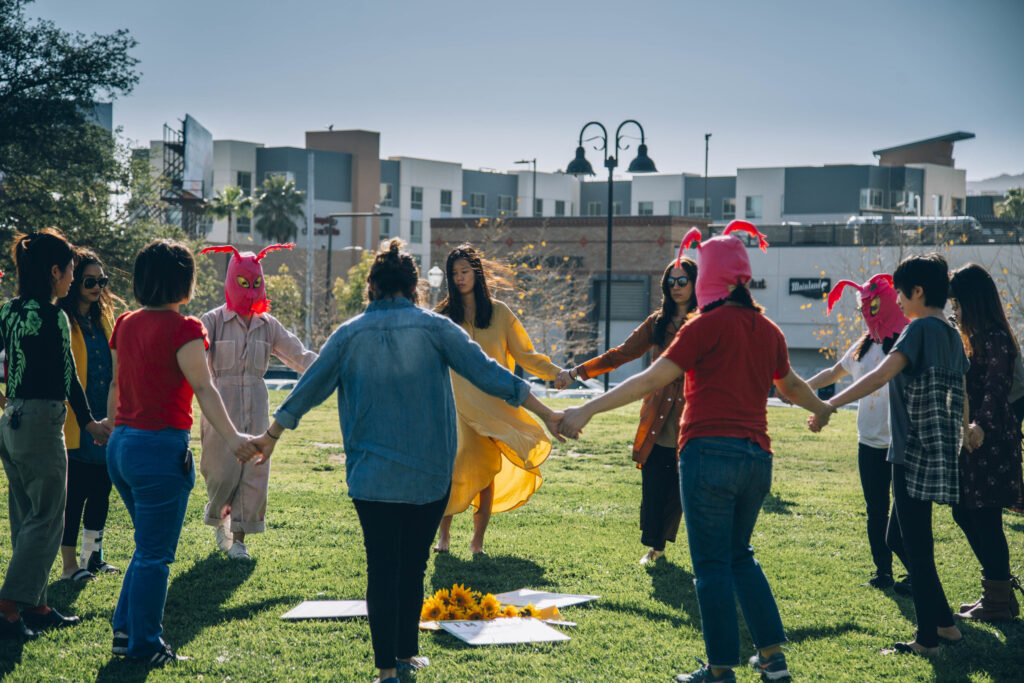Tomorrow Girls Troop (“TGT”)
Tomorrow Girls Troop (“TGT,” or “Ashita Shōjotai” in Japanese) is a social art group that launched on the internet in 2015. It consists of anonymous, self-described “4th-wave feminists” of diverse genders and cultural backgrounds. From Japan to Korea, TGT strives to use art for the purpose of feminist liberation, education, and the fight to preserve cultural memory of generations of women in East Asia. Connecting historical gender-based violence to today’s intersectional fight for women’s rights and LGBTQ+ acceptance, TGT focuses on youth development projects for the sake of feminist socio-historical education.
Inspired by anonymous feminist collective Guerrilla Girls, TGT wears their signature pink masks, mimicking both rabbits and silkworms. According to a member interviewed by DAZED in 2016, many women in Japan see themselves like rabbits: “smart but powerless.” The silkworm references “sericulture,” a labor-intensive silk gathering process typically as “women’s work,” as well as the Japanese mythology of the goddess Oogetsuhime, typically associated with silkworms. The group started in Japan in 2015, posting commentary videos and critiquing Japanese commercials and magazines that romanticize the idea of a “typical Japanese woman/mom/girlfriend” that fits the male gaze on their social media. Over the last decade, TGT has covered a range of pressing feminist topics in East Asia. Some of these initiatives include the push to increase the severity of criminal charges (as well as the duration of prison sentences) for convicted sexual assaulters, the struggle for transgender rights and abortion rights (bodily autonomy, generally), and the long-censored history of “comfort women” through performance art.
TGT first made wide-reaching headlines for their 2017 Change.org petition against the city of Shima in Japan and their sexist (and, frankly, predatory) decision to endorse the “moe” anime character, Megu Aoshima, as their official mascot. Shima was selected as the host city for the 2017 G7 Summit and, in anticipation of their unprecedented global exposure, the character Megu Aoshima was chosen to represent the city to a global audience. This character, explicitly described as a seventeen-year-old girl by her creators, is drawn in the “moe” style, a subculture of Japanese manga and anime in which characters, the majority of which are girls, are simultaneously infantilized and sexually objectified. Although the campaign received backlash from hardcore, mostly male anime fans (“otakus”), oversimplification in online discourse spaces (diminished into a false dichotomy between “feminists vs. otakus”), and worldwide attention of all kinds, it did kickstart a nearly decade-long cultural criticism trend in Japan of feminist critique on Japanese mascots and female representation in the arts. Since the Megu Aoshima incident, a number of municipal promotional campaigns in Japan went viral due to their controversial content—including Minokamo city’s attempt at using a moe character that emphasized the character’s breasts for their city-wide stamp rally event, and “Unako,” a promotional video by Shibushi City for eel (their local specialty), in which the eel is personified as a young girl in a school swimsuit being kept and grown for consumption in a swimming pool by an anonymous male figure. As more people became conscious of these problematic representations of women in mainstream art— the majority of them featuring sexually objectified minors— promotional campaigns put forth by the public sector in Japan routinely came under greater scrutiny by groups following TGT’s example in 2017.
For TGT, “gender” refers to one’s identity that is socially and culturally created as opposed to one’s biological sex. They believe that a feminist is someone who believes in equality of all genders. Their art activism uses art to take action towards gender equality and strives to highlight the dehumanization, sexualization, objectification, and infantilization of portrayals of women in art (in Japan, Korea, and beyond). The collective works to tackle social issues through various projects like performances, videos, photography, graphics, writing, and public discourse campaigns. Focusing on feminism for the younger generation of East Asians, Tomorrow Girls Troop aims to make society more equal and a better life for everyone.

City
Country
Region
Year of Creation
Featured Project

Resources
“Tomorrow Girls Troop: We Can Do It!.” New Jersey City University, https://www.njcu.edu/community/events/tomorrow-girls-troop-we-can-do-it.
Articles:
Duncan, Magdaline. “In Anonymity, Japan’s ‘Tomorrow Girls’ Seek Equality.” Global Journalist, 19, Apr. 2018, https://globaljournalist.org/2018/04/in-anonymity-japans-tomorrow-girls-seek-equality/.
Hegert, Natalie. “The art group preaching girl power to Japan.” DAZED, 24 Feb. 2016, https://www.dazeddigital.com/artsandculture/article/29985/1/the-all-female-art-group-preaching-girl-power-to-japan-tomorrow-girls-troop.
Hongo, Jun. “Japan’s G7 City Abandons ‘Sexist’ Manga Character as Official Mascot.” Wall Street Journal, 6 Nov. 2015, https://www.wsj.com/articles/BL-JRTB-21074.
Isaac, Leigh. “Tomorrow Girls Troop: We Can Do It! Exhibition.” The Gothic Times, 10 Dec. 2024, https://gothictimes.net/13213/features/tomorrow-girls-troop-we-can-do-it-exhibition/.
Kawasaki, Natsu. “Tomorrow Girls Troop: A Fourth-Wave Feminist Art Collective.” Asia Art Archive, 16 May 2019, https://aaa.org.hk/en/like-a-fever/like-a-fever/tomorrow-girls-troop-a-fourth-wave-feminist-art-collective.
Kunimoto, Namiko. “Situating Being a Statue of a Japanese “Comfort Woman”: Shimada Yoshiko, Bourgeois Liberalism, and the Afterlives of Japanese Imperialism.” Verge: Studies in Global Asias, vol. 8 no. 2, 2022, p. 170-200. Project MUSE, https://dx.doi.org/10.1353/vrg.2022.0036.
Shimada, Yoshiko. “Japan’s feminist reckoning.” IPS, 3 Aug. 2022, https://www.ips-journal.eu/topics/democracy-and-society/japans-feminist-reckoning-5774/.
Interviews:
“Node Talk: Feminist Art Activism in East-Asia Today with Tomorrow Girls Troop.” Node Center for Curatorial Studies, Jan. 2021,
https://nodecenter.net/node-talk/Tomorrow-Girls-Troop?utm.
“From Objectification to Agency: Interview with TGT member Myeong-soon Kim.” Uploaded by Tomorrow Girls Troop to Patreon, 8 Jan. 2018, https://www.patreon.com/posts/from-to-agency-16191740.
More Information
IMPORTANT: Profile pages for all collectives are in permanent development and have been built using information in the public domain. They will be updated progressively and in dialogue with the organizations by the end of 2024. New features and sections will be included in 2025, like featured videos, and additional featured projects. Please contact us if you discover errors. For more information on mapping criteria and to submit your organization’s information to be potentially included in the database, visit this page

